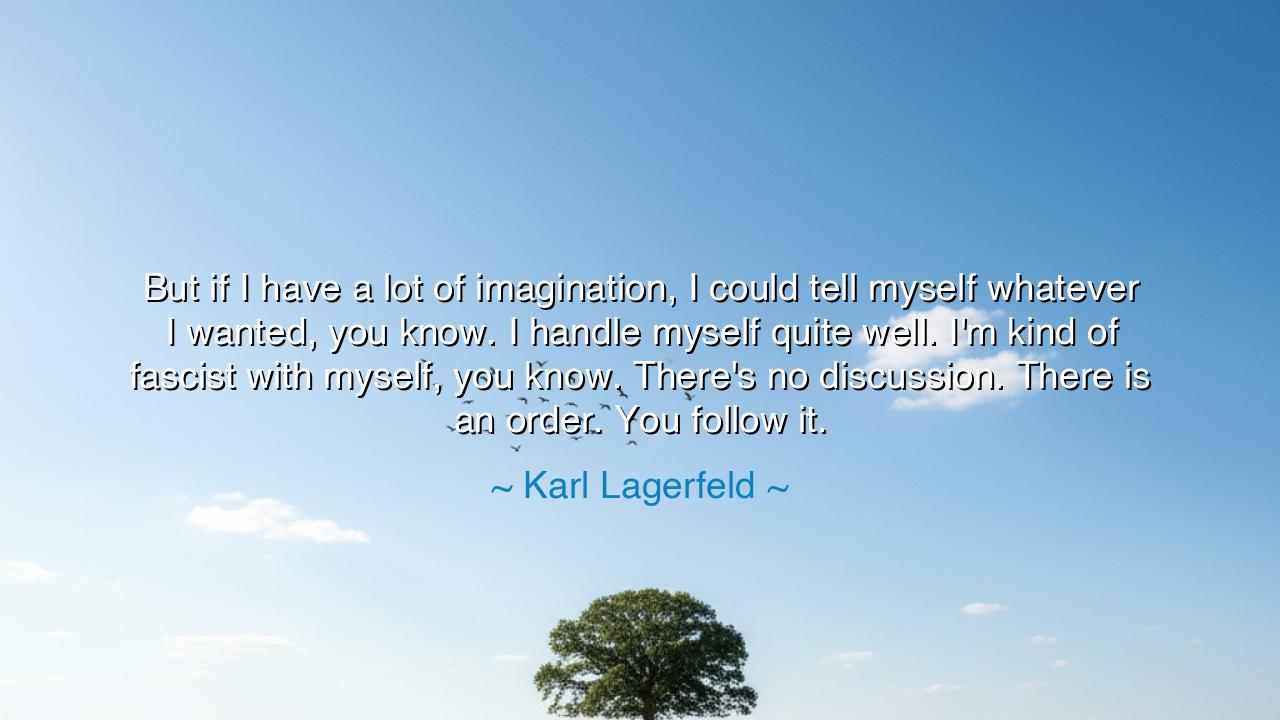
But if I have a lot of imagination, I could tell myself whatever
But if I have a lot of imagination, I could tell myself whatever I wanted, you know. I handle myself quite well. I'm kind of fascist with myself, you know. There's no discussion. There is an order. You follow it.






“But if I have a lot of imagination, I could tell myself whatever I wanted, you know. I handle myself quite well. I'm kind of fascist with myself, you know. There's no discussion. There is an order. You follow it.” Thus spoke Karl Lagerfeld, the master of couture and command, a man who shaped not only garments but worlds of aesthetic order. In these words, the designer reveals a paradox both stern and profound — that true imagination requires discipline, and that freedom of creation is born not from chaos, but from the strict governance of the self. He, who was surrounded by the dazzling excess of fashion, understood that the artist must rule his inner world as a sovereign rules his realm — with power, structure, and unflinching clarity.
At first, the word “fascist” shocks the ear — a term of tyranny, of command without mercy. Yet here, Lagerfeld turns it inward, not outward. He does not speak of oppression over others, but of mastery over himself. The imagination, that wild and radiant power, must not be allowed to drift without direction. For though it creates worlds, it can also destroy focus, scattering the mind across endless possibilities. In his confession — “There’s no discussion. There is an order. You follow it.” — he reveals the secret of the creative warrior: that within him, freedom and control must walk hand in hand.
The ancients knew this truth well. The philosopher Marcus Aurelius, emperor of Rome and ruler of his own soul, wrote daily in his Meditations: “You have power over your mind — not outside events. Realize this, and you will find strength.” Like Lagerfeld, he imposed upon himself a private empire of rules, not to limit his spirit, but to protect it. For what is imagination without discipline? It becomes a storm without a captain, a flood without a vessel. But when the will gives structure to the storm, the same force that could drown the soul instead propels it toward greatness.
Lagerfeld’s life embodied this philosophy. His days were crafted as carefully as his designs. He lived by ritual: drawing every morning, working in silence, refusing idleness. His imagination was immense — yet it never ruled him; he ruled it. In this, he stands among those who understood that the highest form of freedom is self-command. His “fascism,” as he calls it, was not cruelty but focus, not vanity but vigilance. He knew that the artist must often become both servant and sovereign of his own nature — to give order to passion, form to inspiration, and permanence to beauty.
History too offers its mirrors. Leonardo da Vinci, though consumed by ideas that stretched across the heavens, was often undone by his lack of order. His notebooks overflow with genius — yet many of his works were left unfinished, his visions scattered like stars across the night. He possessed infinite imagination, but not always the same iron discipline that Lagerfeld commanded. Compare this with Michelangelo, who toiled day and night beneath the Sistine ceiling, a man possessed by duty to his art. His imagination soared toward the divine, but his body obeyed the command of his will. From his suffering and structure arose eternity.
The wisdom of Lagerfeld’s words, then, is not merely for artists, but for all who wish to master their lives. He teaches that the first kingdom to rule is the self — that one must be both dreamer and commander, poet and general. To tell oneself “whatever I wanted,” as he says, is not delusion but design: to train the mind to believe, to focus, to conquer the weakness of hesitation. “There’s no discussion,” he declares — for the self that argues endlessly achieves nothing. Order must replace doubt. Action must silence indecision. In this way, imagination becomes not an escape, but an empire.
The lesson is clear and enduring: discipline is not the enemy of creativity; it is its foundation. To live as Lagerfeld lived — sharply, intentionally, without apology — is to know that freedom without structure is waste, and imagination without rule is folly. The artist of life must become the architect of his own soul, commanding it as a sculptor commands marble — with firmness and purpose, until beauty emerges.
So, my friends, remember: the mind is a kingdom. Within it dwell rebellion and order, chaos and creation. To master them, as Karl Lagerfeld did, is to rise beyond the noise of the world and shape one’s destiny with precision. Be gentle with your dreams, but severe with your habits. Let your imagination roam, but let your will bring it home. For only when the spirit obeys its own command does it become truly free — and only then can the artist, the thinker, the human being, say with strength and serenity: “There is an order. You follow it.”






AAdministratorAdministrator
Welcome, honored guests. Please leave a comment, we will respond soon